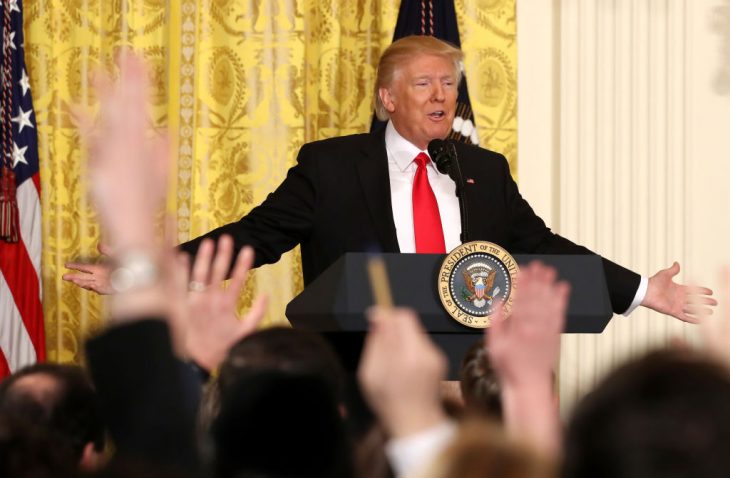The most dangerous place in Washington DC, the old joke goes, is between a politician and a television camera. It’s a wonder there are any such places left, so intimate have the third and fourth estates become. Periodically, American journalism gets itself into a funk over its proximity to power and the consequences for integrity and neutrality. The lamentations are sincere but short-lived and before long the quarrelling lovers are reconciled and slip into old habits. ‘I hate myself for loving you,’ sang Joan Jett & the Blackhearts, lashing at the morbid affections of co-dependency.
Iraq was supposed to be The Line. The press corps concluded in retrospect that it had been too credulous about the Bush administration’s claims. It failed to scrutinise the case for war, the intelligence on weapons of mass destruction, and the preparations for post-war reconstruction. This would never be allowed to happen again, we were assured; but self-reproof without reparation is mushy self-help, the ego is massaged but the soul unsaved. Soon enough, Barack Obama arrived and the fearless inquisitors reverted to awestruck scribes, jotting reverently from the hopey-changey court of New Camelot.
With the arrival of Donald Trump, introspection is in again and an unlikely test of principle emerged in the form of the White House Correspondents’ Dinner. The White House Correspondents’ Association (WHCA), which hosts the annual gala, represents the journalists who cover the President day-to-day and awards scholarships to young reporters. The dinner usually involves two skits: one by the President, who gently mocks the press and himself, and another by a broadly sympathetic comedian who ribs the Commander-in-Chief more or less respectfully while saving their most brutal jibes for his opponents.
This year, the laughter will be shallower still. Donald Trump has tweeted that he won’t be coming, after the New Yorker and Vanity Fair cancelled their annual parties and the Guardian said it wouldn’t be sending a representative. Celebrities had announced boycotts and Samantha Bee, a late-night comedian of the Trump-Hitler-applause variety, is even throwing a competing bash for opponents of the President. America doesn’t just have alternative facts, now it has alternative soirées. The dilemma reporters faced was understandable — many US presidents have reviled the press before but none quite in the same way Trump has — but surely the answer was obvious all along: Any journalist worth their notepad should boycott the White House Correspondents’ Dinner every year.
The event might seem innocuous enough; professional rivalries set aside for overcooked fish and undercooked jokes. However, it is this very clubbability, this did-Finn-get-into-Princeton cosiness that has drained the DC swamp of all public trust and confidence. Seeing them up there, guffawing at wan presidential punchlines and opaque insider gags, knocking back the Bolly while a Hollywood turn cracks open vintage snidery about Christians, gun-owners and the flyover states — it’s enough to make anyone want to leap head-first into the basket of deplorables.
When you become friendly with politicians you start to convince yourself they’re human beings, and nothing good comes of that. This affliction befell James ‘Scotty’ Reston, a lion of American political journalism who enjoyed intimate access to senators and senior staffers and was known as the hack all the most important people read. But Clydebank-born Scotty got too close and came to see his role as articulator rather than interrogator, interpreting his favoured politicians for the masses. When Teddy Kennedy drove off a bridge in Chappaquiddick and left Mary Jo Kopechne to die, Scotty was the first reporter on the scene and filed a despatch for the New York Times that began: ‘Tragedy has again struck the Kennedy family.’
Truth be told, I’m not keen on the Spectator’s Parliamentarian of the Year awards either. We shouldn’t be giving these people the idea that what they do is virtuous. Journalism in Britain remains a trade rather than a profession, despite the best efforts of universities with pound signs in their eyes. And yet it is our approach, sneering and scoundrel-ridden, that does a better job of holding the powerful to account. The cynical idealists of the US press corps, rebellious foot soldiers of the First Amendment, solemnly rise when the President enters the room. This, they insist, is out of respect for the office and the republican ideal. Try suggesting Westminster’s jaded hacks stand in the presence of Theresa May and you’d be laughed out the room. British journalists set out to be bulldogs and almost incidentally function as guard dogs. American journalists set out to be guard dogs and too often end up as lap dogs.
The 2011 Correspondents’ Dinner saw Obama and actor Seth Meyers humiliate one of the Republican presidential candidates in the room, mocking his accent, his appearance, and his chances of becoming president. Years later, the New York Times wondered if this was the night that convinced Donald Trump to make a more serious run for the presidency in 2016 and show them all, something Trump denies so it’s almost certainly true. The White House Correspondents’ Dinner flatters the president, compromises the press, and leaves the public jaundiced. These faults are as nothing compared to the possibility that it helped put Donald Trump in the White House. No one’s laughing now.
Stephen Daisley is a blogger for Coffee House and a columnist for the Scottish Daily Mail







Comments